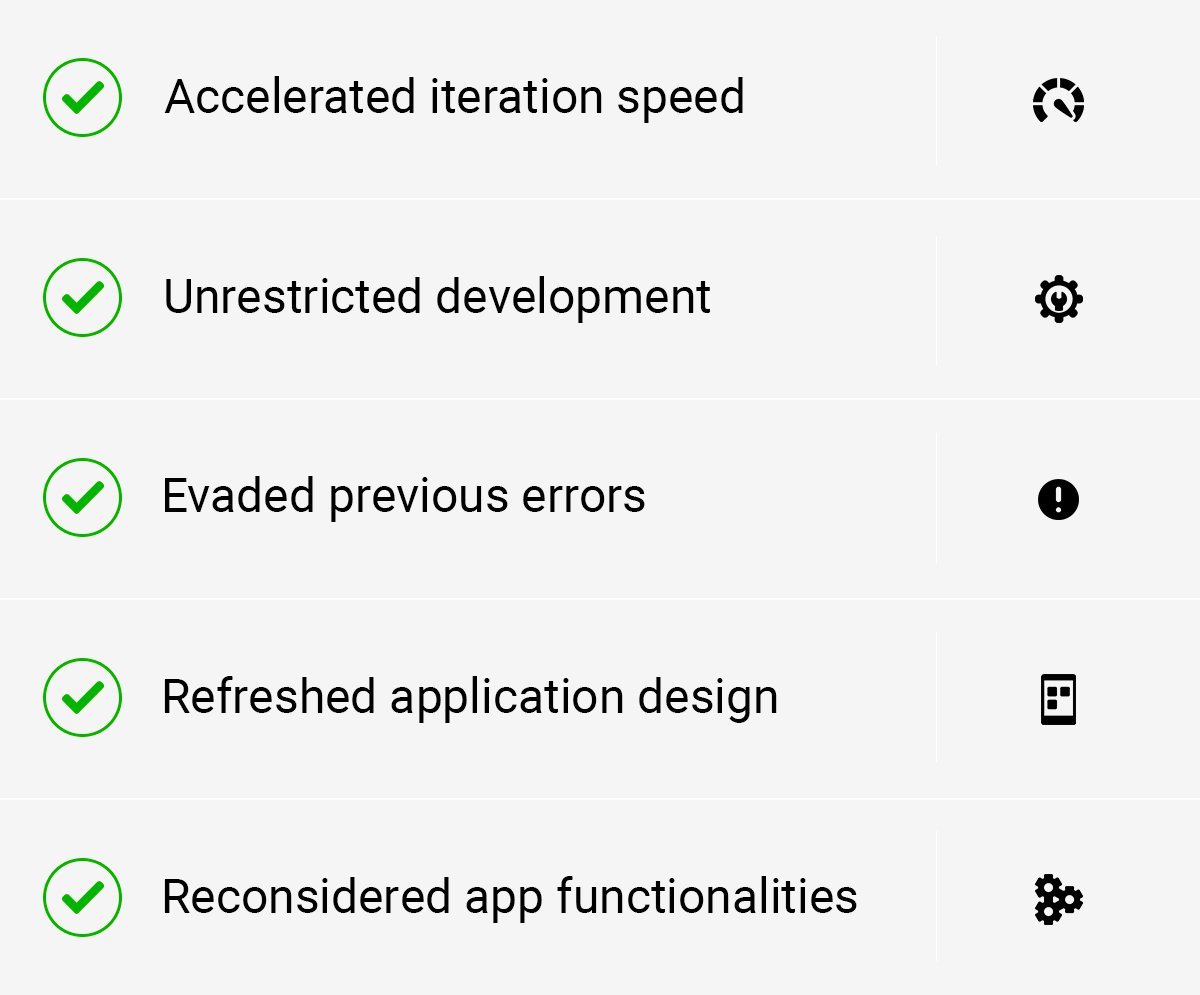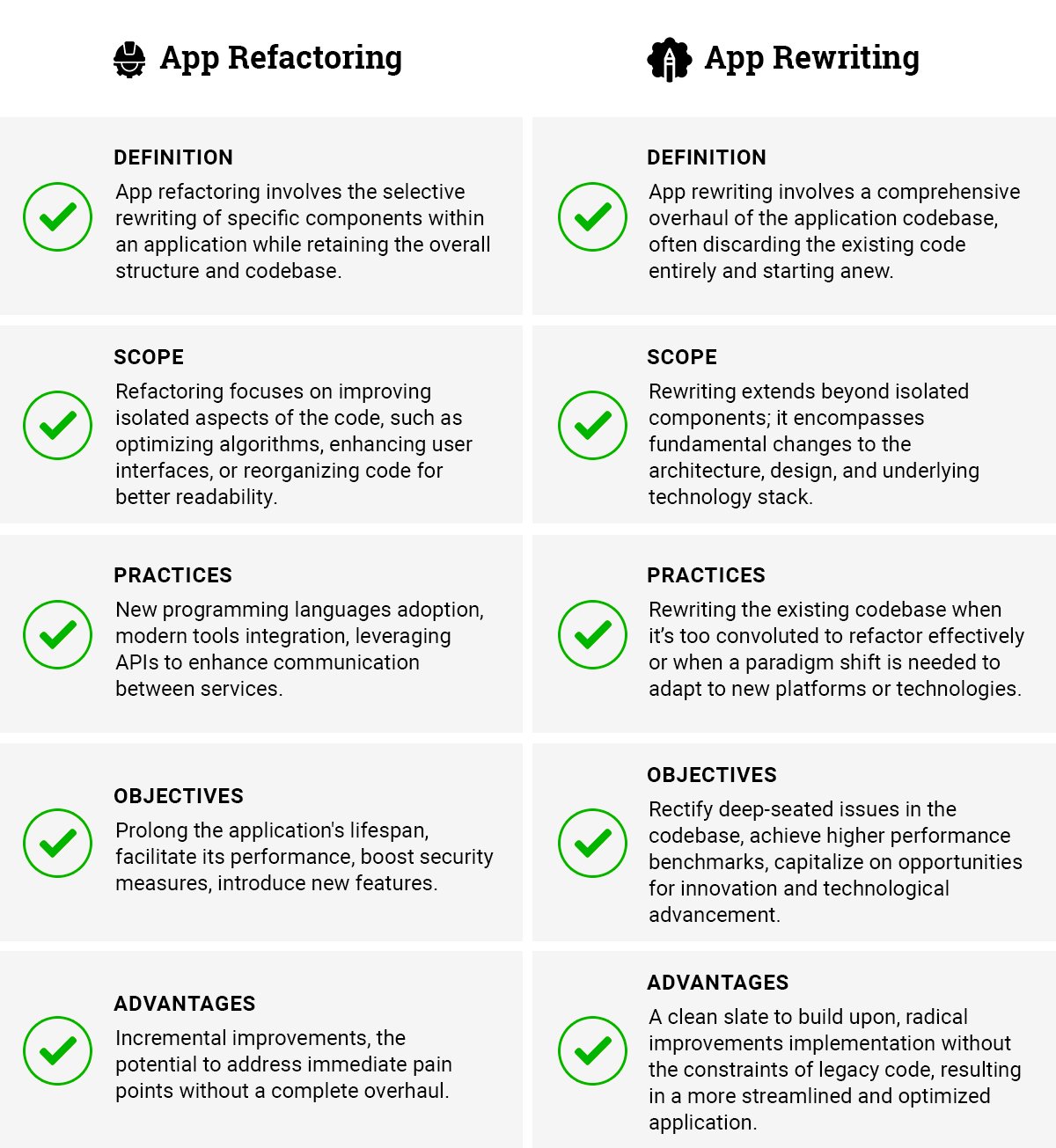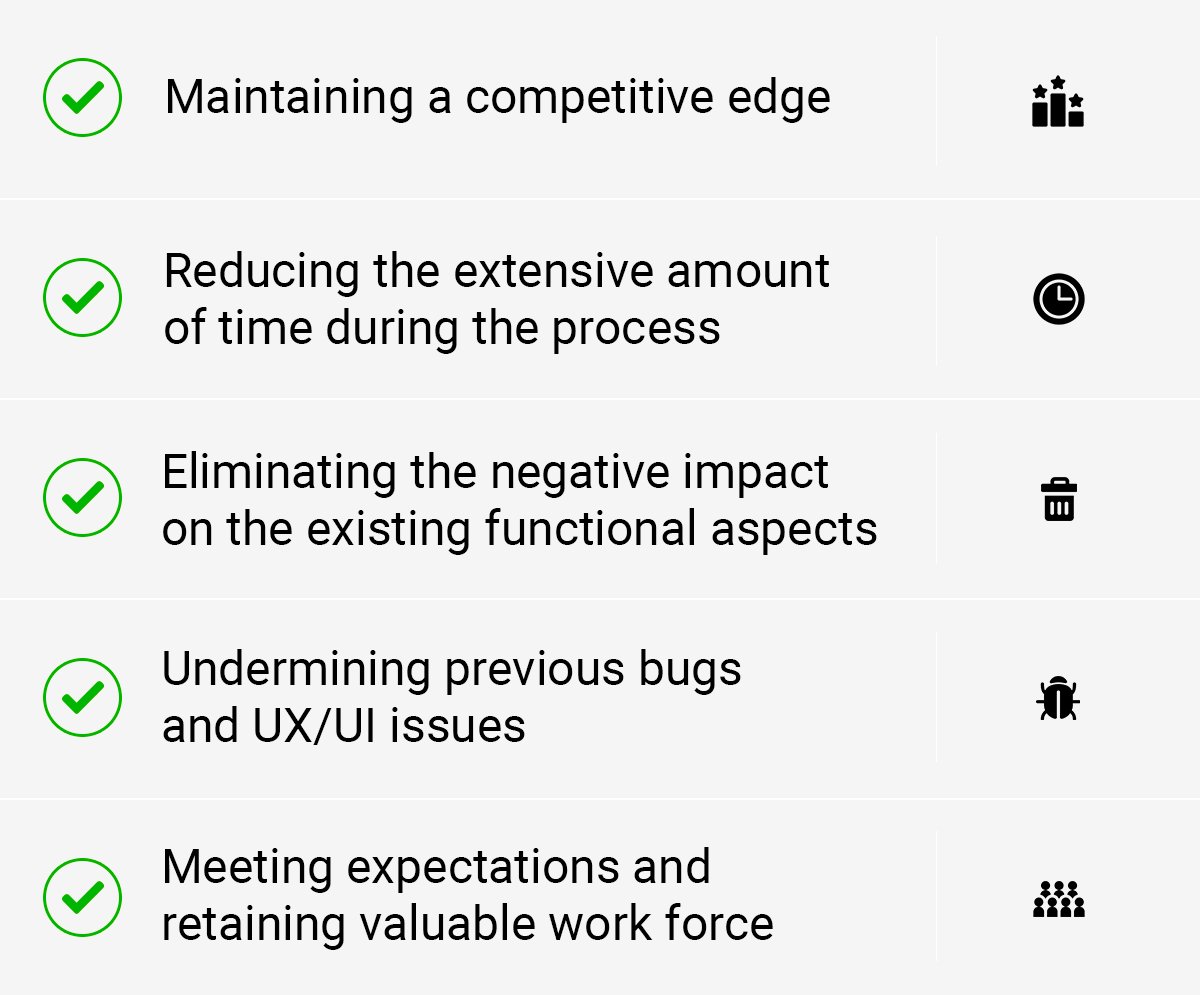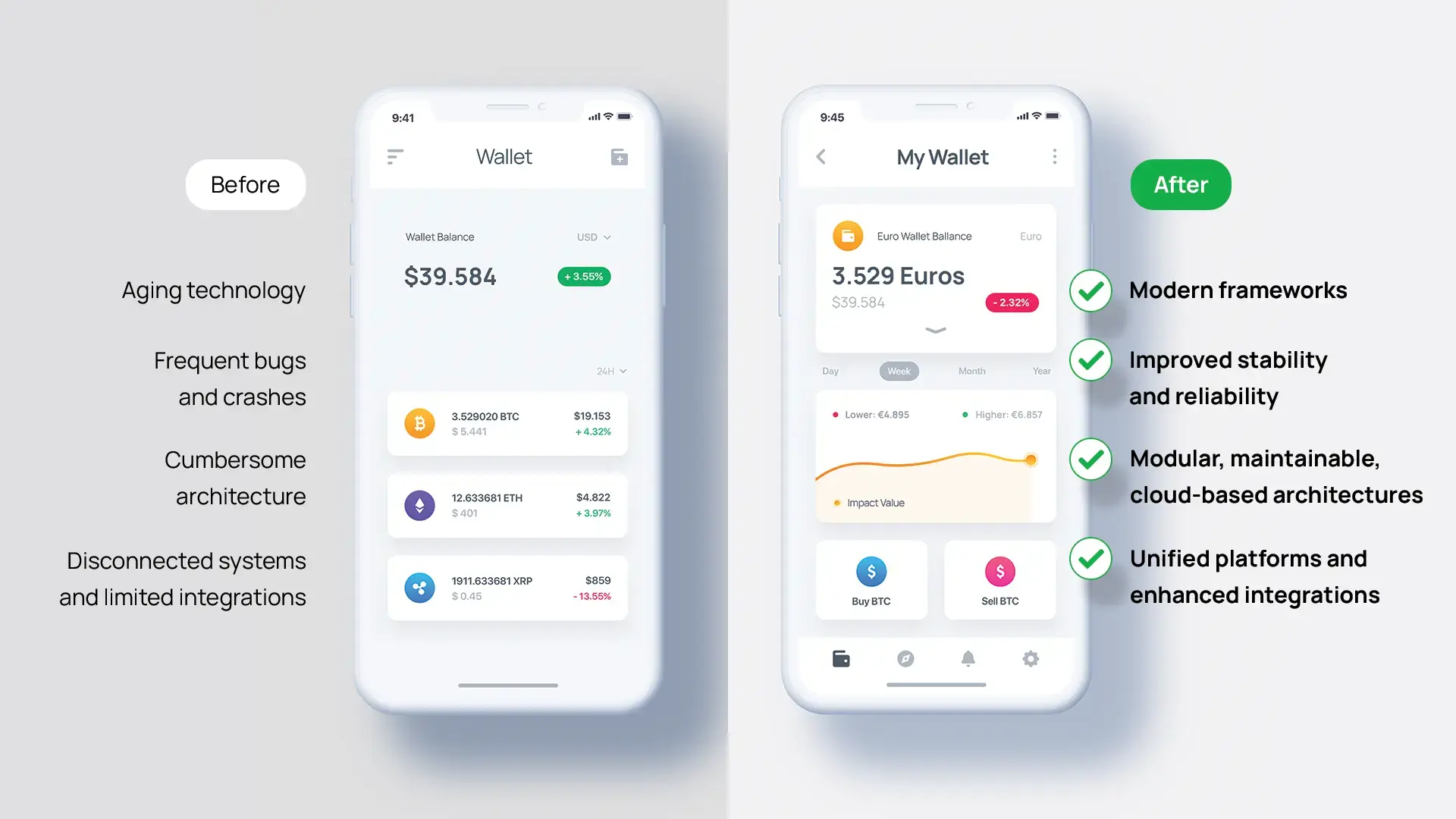In the swiftly evolving landscape of technology, where innovation and adaptability are non-negotiable, businesses must remain acutely aware of the critical issue of mobile app crashes and the profound repercussions they exert on both users and enterprises. Mobile app stability is not merely a matter of convenience; it is intrinsically tied to user satisfaction, brand credibility, and ultimately, business success.
Have you already implemented preventive measures, yet still encounter persisting app instability? Then it's essential to recognize that there may be deeper-rooted causes lurking beneath the surface, waiting to be uncovered and addressed. And one transformative strategy for businesses seeking to stay ahead of the curve that can help you solve the app crashing issue is application rewriting.
The art of app rewriting is more than just a process; it's a testament to the pursuit of improvement and the commitment to providing users with software that is not just functional, but exceptional.
This article delves into the intricacies of app rewriting, exploring the pivotal role it plays in rejuvenating software mobile solutions. From critical distinctions between rewriting and refactoring to the opportune moments for legacy app reconstructing, we navigate through the challenges and advantages, all while highlighting the invaluable contributions of experienced tech partners in mitigating risks and guiding businesses towards successful mobile implementation.
The essence of application rewriting: When and why it matters
Application rewriting refers to the intricate process of completely reimagining and reconstructing application code from scratch, often without reusing the existing source code. This endeavor becomes necessary under a variety of circumstances, each stemming from the evolving nature of technology and software development.
The right moment for legacy app rewriting
Recognizing the opportune time to initiate an application rewrite involves a careful consideration of a multitude of factors that collectively reveal the need for a fresh start:
- Feature limitations: When attempts to introduce new features are consistently obstructed by the limitations of the existing source code, it becomes apparent that achieving innovation requires a clean slate.
- Inheritance of unmaintainable code: When inheriting legacy code from another company, lack of documentation, coupled with intricate components, renders the codebase nearly impossible to work with.
- Technical debt accumulation: The accumulation of technical debt, evident in constant bug fixes, a convoluted codebase, inefficient UX/UI, and a growing list of code lead to deeper underlying issues.
- Persistent low mobile app stability: If the mobile application consistently exhibits low stability, frequently crashing due to issues related to error handling, memory management, or inadequate testing, this serves as a glaring indicator that the time for app rewriting may have arrived.
- Complex maintenance and difficulties in debugging: Routine maintenance becomes an uphill battle due to code complexity or the existing codebase becomes convoluted and arduous to manage, impeding the progress of development and innovation.
- Outdated interface and architecture: A user interface that has fallen out of step with modern design principles leads to the realization that a fundamental architectural overhaul is needed. Crafting new code affords the opportunity to expand functionality, rectify prior issues, and supersede past limitations.
- Security and performance concerns: The emergence of security vulnerabilities in the legacy codebase and an increasing gap between performance benchmarks and security & data protection demands.
In addition, scenarios where the original source code is lost, the number of active users is dwindling, or a shift towards a new architectural paradigm is imminent, also make a strong case for legacy app rewriting. Deciding on the right moment for an application rewrite requires a holistic evaluation of these factors, aligning the development trajectory with long-term goals, innovation, and the pursuit of a robust and adaptable software solution.
Curious to know how healthy your app is? An application health calculator that assesses the overall health and performance of the application can make light of all the improvement areas in order to enhance your app's functionality and user experience.
Overcoming legacy code constraints by reinventing mobile app excellence
App rewriting holds a multitude of compelling benefits for businesses that seek to invigorate their mobile app solutions and position themselves for sustained growth and adaptability to customers’ needs, better UX, evolving technology, development velocity or maintenance support, among others. Thus, businesses gain access to a spectrum of advantages that transcend the limitations of legacy code and pave the way for innovation:
- Streamlined adaptation to new technology: App rewriting eliminates the arduous task of retrofitting existing code to align with new technology stacks, facilitating smoother transitions and future technological upgrades.
- Platform agility: Rewrites empower applications to seamlessly migrate to platforms conducive to embracing evolving development paradigms, ensuring compatibility with emerging trends and requirements.
- Informed evolution: By drawing insights from past mistakes and prior experiences, developers can redesign the application, avoiding pitfalls and creating maintainable, efficient, and future-proof code.
- Expanded market horizons: A rewritten application can capitalize on new market opportunities, catering to new user segments, platforms, and technologies, thus broadening the application's reach and impact.
- Elimination of unmaintainable code: The process of rewriting affords the opportunity to remove unmaintainable legacy code and complexities that hinder development progress and debugging efficiency.

Pros of rewriting an app from scratch: Faster, fresher, flawless mobile excellence
App rewriting vs. App refactoring
When considering the evolution and enhancement of mobile applications, app rewriting and app refactoring emerge as prominent choices, each offering distinct approaches, tailored to specific scenarios and use cases, in order to revitalize mobile software functionality.
While both strategies aim to enhance mobile applications, the choice between app rewriting and app refactoring hinges on the depth of transformation required and the associated risks. App refactoring offers an incremental and targeted approach, ideal for addressing specific pain points, whereas app rewriting empowers developers to envision and implement a brand-new application architecture.

Choosing the right tech partner for app rewriting and mitigating risks
However, in today’s digital landscape, it's no longer solely about possessing cutting-edge technology; it's about having the adept and right people who can, on the one hand, navigate it proficiently and mitigate any inconvenience, and on the other hand, possess extensive experience across the entire development lifecycle.
- Business downtime impact: the risk and repercussions of potential downtime in the event of issues during the transition, necessitating comprehensive strategies to minimize disruptions to operations.
- Resource expenditure: the significant investment of time and resources required to manage the existing codebase as it evolves in parallel with the rewriting process.
- Employee retention: the potential loss of valuable employees due to overexertion caused by the demands of managing cumbersome tools and navigating the intricacies of rewriting.
- Opportunity cost: the risk of forgoing potential business opportunities and growth due to an inability to swiftly adapt and extend the application to meet evolving business needs. Also, app rewrites entail duplicating resources, maintaining the functionality of the old code, fixing bugs and updating features during the creation of the new code - all which contribute to this complex process.

Challenges conquered with the expertise of the right tech partner and app rewriting implementation
Engaging a tech partner with a wealth of experience can play a pivotal role in navigating these challenges. Such partners bring a comprehensive understanding of best practices, risk mitigation strategies, efficient workflows, and ways to optimize the use of new technology, providing businesses with a smoother path to app rewriting success.
Rewriting an app involves a substantial time commitment, and that's why businesses need to entrust a partner who offers solutions that optimize this process while minimizing disruptions and safeguarding against potential pitfalls.
At Zitec, we recognize that app rewriting can be an intricate journey, but we have the know-how in terms of expertise and efficiency for the needed guidance through each phase of the process. Our skilled developers meticulously analyze the old code to identify crucial functions for integration into the new codebase, ensuring a seamless transition.
To mitigate the risk of introducing defects during the process, we maintain a vigilant approach, providing timely bug fixes that contribute to a cleaner codebase, while allowing businesses to focus on innovation and optimization.
Application rewriting as a strategic avenue to rejuvenate mobile apps
The field of application rewriting presents businesses with a transformative opportunity to not only overcome obstacles but also unlock the doors to heightened performance, greater adaptability, and boundless innovation. Through this, companies can untangle themselves from the limitations of legacy code, surging forward with renewed agility and relevance.
Check out how businesses from various industries have managed to solve their specific pain points - including obsolete infrastructures, high bug rates or development velocity impediments - all through app rewriting.
By partnering with experienced tech professionals, the path becomes clearer, and challenges are turned into stepping stones toward software excellence. Contact us and discover how through strategic mobile app architecture planning, you can systematically release new mobile app chunks, seamlessly replacing the old app and ushering in a new era of innovation.






